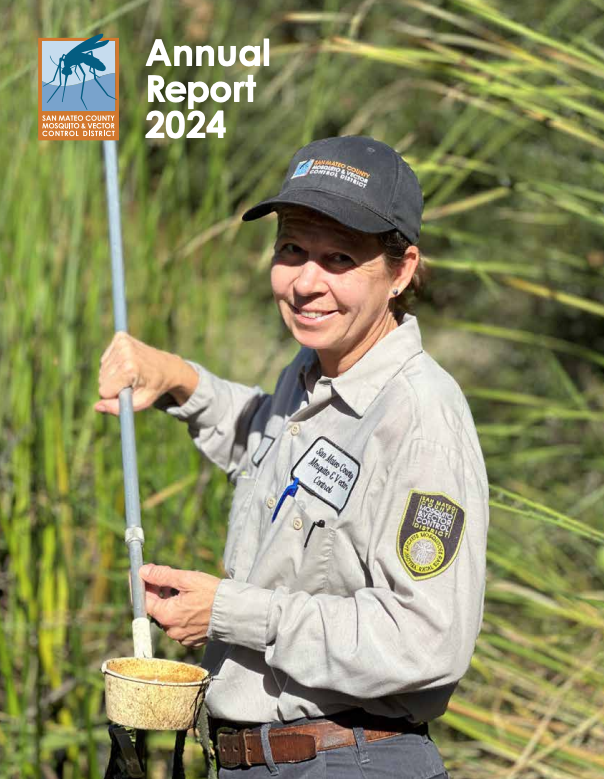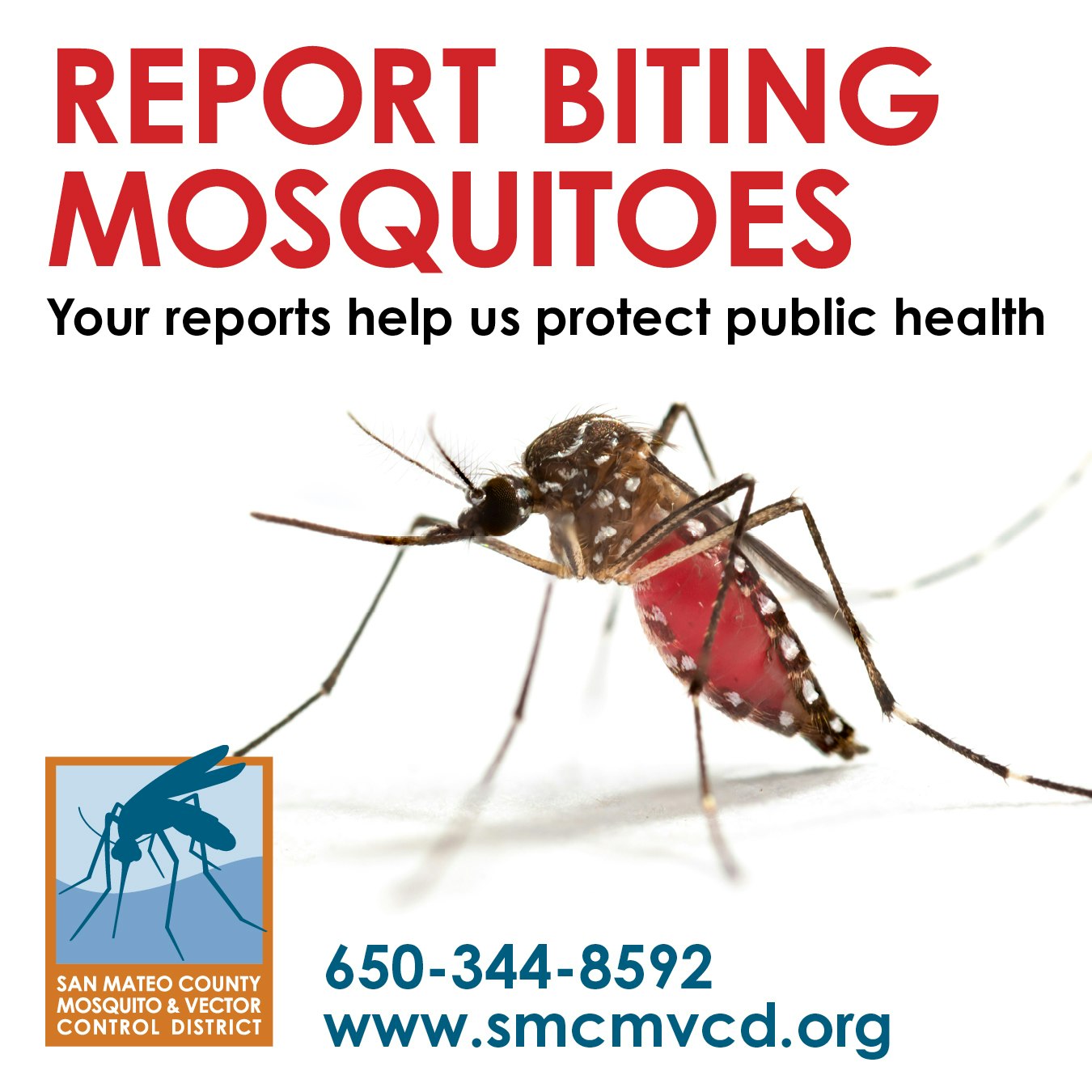August 2025 Newsletter

2024 Annual Report
We are pleased to share our 2024 Annual Report. The report contains information about our board, finances, services, and metrics from 2024. Check it out and let us know any questions!
West Nile Virus Updates - Stay Informed

Dead bird reporting and testing
West Nile virus occurs throughout California and is primarily a disease that birds and mosquitoes pass back and forth to each other. Not all birds infected with West Nile virus will get sick, but West Nile virus can make some birds - like crows, ravens, and jays - very sick and even cause death. (An important note as backyard chicken flocks become popular is that chickens do NOT get ill or die from West Nile virus infection.)
Our work during the summer months is particularly focused on reducing the risk of people in San Mateo County getting infected with West Nile virus. One way is through testing dead birds for West Nile virus to see if West Nile virus is in a certain area.
You can report dead birds online or by calling 1-877-WNV-BIRD. If a dead bird is reported in San Mateo County, our District will pick it up and test it for West Nile virus. Please note that we do not test for avian influenza, as avian influenza is not a disease that is spread by mosquitoes and our laboratory testing is set-up to test only for West Nile virus and a few other viruses that mosquitoes can spread. Also note that birds must be in 'testable' condition - that means they must have died within the past 24 hours.
If a bird is positive for West Nile Virus, we set up mosquito traps around the location the bird was found to determine if there are West Nile virus-positive mosquitoes in the area.
To learn more about West Nile virus, visit https://westnile.ca.gov/
Current West Nile virus information for San Mateo County
As of mid-August, residents have reported 425 dead birds in San Mateo County. Of those, 119 were in testable condition and tested in our laboratory. None of the dead birds collected in San Mateo County have tested positive for West Nile virus so far in 2025. Visit our webpage to stay up-to-date with San Mateo County information. To stay up-to-date with statewide information, visit the webpage with California state-wide data.
No mosquitoes have tested positive for West Nile virus yet this year in San Mateo County. However, West Nile virus has been found in mosquitoes in other counties in Calfornia, so if you are traveling don't forget to take your mosquito repellent and follow other tips to prevent mosquito bites and the diseases they can spread.
2025 Big Lift Summer Program Support

During the school year, our classroom education outreach program is very busy! During the summer, we lend the classroom materials to summer programs. This year, our classroom materials were lent to the Big Lift Inspiring Summer programs held at schools throughout San Mateo County. The Big Lift initiative is led by the County of San Mateo, San Mateo County Libraries, and San Mateo County Office of Education with the aim of increasing third grade reading proficiency in San Mateo County through evidenced-based strategies and collaboration with community stakeholders. We're glad to spread mosquito learning and maximize the use of our classroom resources by lending materials to this program.
In the Headlines - Chikungunya in China
You may have heard about an outbreak of chikungunya in a focal area in China. We do not currently have a risk of chikungunya in San Mateo County.
Chikungunya is a virus that is spread through the bites of infected mosquitoes, specifically Aedes aegypti (pronounced "ay-dees uh-gyp-ti") and Aedes albopictus mosquitoes. Aedes aegypti mosquitoes are not native to California, but they have been slowly spreading throughout the state. Although Aedes aegypti has not been detected in San Mateo County since 2015, this species has recently been found as near as Santa Clara County and Alameda County.
Aedes aegypti mosquitoes are small mosquitoes with black-and-white stripes. They bite during the day, tend to bite on the lower legs and feet, and are very quick! Many people do not realize until they later notice itchy bites. Aedes aegypti mosquitoes are very good at living in and around our homes - they lay their eggs stuck to containers where water accumulates. When the container fills with water, the eggs hatch, and the mosquito can grow through its larval and pupal forms to become a biting adult mosquito. Even just a bottle cap of water is enough for them to grow through their lifecycle. Other common places that hold water suitable for Aedes aegypti are saucers under potted plants, vases with fresh flowers, kids toys, and tires.
Besides being annoying biters, Aedes aegypti mosquitoes are capable of spreading viruses like chikungunya, Zika, yellow fever, and dengue. In other areas of the US (including as close by as southern California) where returning travelers or visitors had been infected with dengue abroad and were bitten by local Aedes aegypti mosquitoes, there have been cases of locally-acquired dengue virus spread to people by infected Aedes aegypti. This risk is currently very low in most areas of the US, with mosquito control districts and health departments working together to quickly respond to these cases. If you will be traveling to areas with Aedes aegypti, pack an EPA-registered insect repellent to protect yourself from mosquito bites and the diseases they can transmit.
We really don't want these mosquitoes to arrive and establish in San Mateo County! Please remember to dump standing water, don't overwater potted plants, and report biting mosquitoes. Especially if you are being bitten during the day, please call us to report. We follow-up on the calls to check for water where mosquitoes may grow, we may set traps to capture a few mosquitoes to see which species they are, and we check-in with neighbors to make sure no one is accidentally growing mosquitoes in their yard!
With your help, we hope to keep Aedes aegypti out of San Mateo County!

